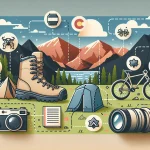Boulder, a vibrant city settled at the foothills of the Rocky Mountains, has long been a mecca for outdoor enthusiasts, particularly climbers, which makes Boulder safety very important. With its world-class climbing destinations, thriving climbing community, and unparalleled natural beauty, Boulder offers an unmatched experience for climbers of all levels.
In This Article
The city of Boulder is nestled in the heart of the Rocky Mountains in Boulder County, Colorado. It is one of the best places to visit beautiful mountain areas in the United States. Boulder safety is the utmost of priorities for both visitors and residents alike.
TL;DR
- Boulder boasts a diverse range of climbing opportunities, from alpine bouldering to granite slabs, catering to various climbing styles and grades.
- The city's proximity to the Rocky Mountain National Park and other iconic climbing spots makes it a hub for climbing enthusiasts worldwide.
- Boulder's climbing culture and community foster a welcoming and supportive environment for climbers to learn, train, and connect.
Bouldering and Climbing Scene
Boulder’s climbing scene is truly exceptional, drawing climbers from around the globe. The city’s backyard, the Flatirons, offers a plethora of bouldering problems and climbing routes on the iconic slabs of sandstone. For those seeking a more adventurous challenge, the nearby Rocky Mountain National Park presents a playground of alpine bouldering and high-altitude climbing on granite faces.
The variety of climbing styles and grades available in Boulder caters to climbers of all skill levels, from beginners to seasoned professionals. Whether you’re a fan of technical face climbing, crack climbing, or the thrill of bouldering, Boulder has something to offer.
High-Altitude Adventures
One of the unique aspects of climbing in Boulder is the opportunity for high-altitude adventures. The Rocky Mountains provide a breathtaking backdrop for climbers seeking to push their limits and conquer the challenges of thin air and extreme conditions.
Climbing at high altitudes requires specialized techniques, training, and gear. Boulder’s climbing community is well-equipped to guide and support climbers in preparing for these demanding yet rewarding experiences. From acclimatization strategies to proper equipment selection, climbers can ensure a safe and enjoyable high-altitude climbing experience.
Climbing Education and Training
Boulder is home to numerous climbing schools, courses, and workshops that cater to climbers of all levels. Whether you’re a newcomer to the sport or an experienced climber seeking to refine your skills, Boulder offers a wealth of educational resources.
Climbing schools provide comprehensive instruction on techniques, safety protocols, and gear usage, ensuring that climbers have a solid foundation before venturing out on the rock. Advanced training opportunities, such as clinics and workshops led by professional climbers, allow experienced climbers to take their skills to new heights.
The Climbing Community and Lifestyle
Beyond the physical aspect of climbing, Boulder’s climbing community is a vibrant and welcoming one. Climbers from all walks of life come together to share their passion, exchange knowledge, and forge lasting connections.
Local climbing events, festivals, and community-building activities foster a sense of camaraderie and belonging among Boulder’s climbing enthusiasts. The shared values of respect for the environment, personal growth, and adventure bind this community together, creating a unique and inclusive climbing culture.
Rock Climbing Equipment
When it comes to sports climbing, you’ll need the right rock climbing equipment. Be sure to have things like rope, climbing shoes, fixed anchors, lead climbers, a belay device (multiples, preferably), a carabiner (many, preferably), harness, chalk, and this is just the start.
Climbing classes and practicing on an indoor climbing wall are recommended before you venture out into the wild. A climbing gym is an excellent place to start, as this is where many rock climbers begin and practice regularly. Climbing classes will help you learn safety protocol and the proper climbing technique. Why not go with a climbing partner? Remember, there’s safety and more fun in numbers!
FAQ
What is the best time of year to visit Boulder for climbing?
Boulder offers excellent climbing opportunities year-round, but the prime seasons are spring and fall when the weather is mild and dry. Summer can be hot, while winters can bring snow and ice, making some routes inaccessible.
Are there climbing opportunities suitable for beginners in Boulder?
Absolutely! Boulder has a wide range of climbing areas and routes suitable for beginners, including indoor climbing gyms and outdoor bouldering areas with easy-to-moderate problems. Many climbing schools also offer introductory courses and guided trips for novice climbers.
What safety precautions should climbers take when climbing in Boulder?
Safety should always be a top priority when climbing in Boulder. Proper gear, including helmets, harnesses, and ropes, is essential. Climbers should also be aware of the risks associated with high-altitude climbing, such as altitude sickness, and take appropriate measures. It’s recommended to climb with experienced partners or guides, especially when tackling more challenging routes.
How can climbers contribute to the preservation of Boulder’s climbing areas?
Boulder’s climbing community is committed to preserving the natural beauty and integrity of the climbing areas. Climbers can contribute by practicing Leave No Trace principles, respecting access regulations, and participating in trail maintenance and conservation efforts organized by local climbing organizations.







